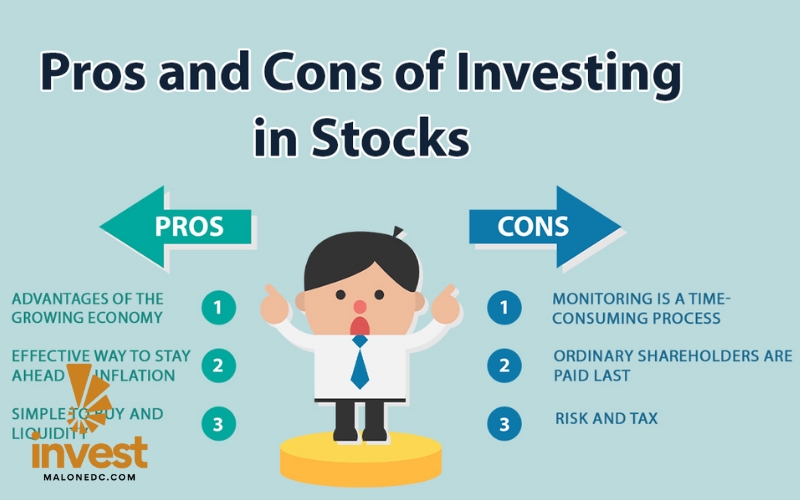Investing in stocks has long been a popular way to increase personal wealth. Profitable opportunities from the stock market can bring great benefits, but at the same time, it also comes with many risks. Understanding the benefits and risks of investing in stocks is extremely important for every investor. This article will provide a comprehensive view of the strengths and weaknesses of investing in stocks, helping you make wise and reasonable decisions.
BENEFITS OF INVESTING IN STOCKS
1. OPPORTUNITY FOR HIGH PROFIT
One of the most obvious benefits of investing in stocks is the ability to generate high profits. The stock market can bring profits that are superior to other forms of investment such as savings or real estate investment, especially in the long term. Companies with strong growth potential will often have stable stock prices, bringing profits to investors. For example, large technology companies such as Apple, Microsoft, or Tesla have demonstrated strong profit potential from sustainable development, bringing large profits to shareholders.

2. HIGH LIQUIDITY
Stocks are one of the assets with high liquidity, meaning you can easily buy and sell stocks at any time during market trading hours. This liquidity gives investors more flexibility in adjusting their investment portfolio and realizing profits or cutting losses when necessary. Compared to other types of investments such as real estate or gold, stocks offer superior flexibility in the ability to transfer assets.
3. DIVERSIFYING INVESTMENT PORTFOLIO
Investing in stocks also provides an opportunity to diversify your investment portfolio. By investing in stocks of many companies, you can minimize the risk when a company is in trouble or when the stock market is volatile. In addition to stocks, investors can choose to add stock investment funds, bonds, or other financial products to create a diversified investment portfolio, thereby minimizing risks and optimizing profits.
4. OPPORTUNITY TO PARTICIPATE IN THE GLOBAL MARKET
With the stock market, investors are not limited by national borders. You can participate in major global stock markets such as New York (NYSE), London (LSE) or Tokyo (TSE), providing the opportunity to access large and potential international companies. Investing in international stocks helps you not only diversify your portfolio but also take advantage of growth opportunities from strongly developed economies.
5. PASSIVE INVESTMENT
Another benefit of investing in stocks is the ability to invest passively through index funds or ETFs (Exchange Traded Funds). These funds help investors own a diversified portfolio of stocks without having to spend time researching and analyzing each individual stock. This is an ideal choice for investors who do not have much time or experience in analyzing stocks, helping to minimize effort and still be able to benefit from market developments.
RISKS OF INVESTING IN STOCKS
1. MARKET RISK
Stocks are a highly volatile asset, so the stock market can change quickly and unpredictably. Factors such as macroeconomic conditions, politics, interest rates, or unexpected events (such as the COVID-19 pandemic) can cause dramatic fluctuations that affect the value of stocks. If not managed properly, these fluctuations can result in significant losses for investors.
2. COMPANY RISK
When investing in a company’s stock, investors face the risk that the company may encounter financial difficulties or even go bankrupt. Factors such as changes in business strategy, declining profits, or poor management can cause a sharp decline in stock value. For example, if a company experiences a scandal or major incident, its stock may suddenly drop in price, causing losses for investors who hold that stock.
3. INFLATION AND INTEREST RATE RISK
Another major risk factor when investing in stocks is inflation and changes in interest rates. When interest rates rise, companies’ borrowing costs also increase, reducing profits and the value of stocks. At the same time, inflation can reduce the real value of the profits investors receive from stocks. Without a proper hedging strategy, these factors can reduce the profitability of investments.
4. LIQUIDITY RISKS
Although securities are highly liquid, not all stocks are easy to trade. Some stocks of small companies or unlisted companies may lack liquidity, making it difficult for you to buy and sell. In these situations, not being able to sell stocks when necessary can lead to not cutting losses in time, thereby increasing losses for investors.
5. POLICY AND LEGAL RISKS
An unavoidable risk when investing in securities is changes in policies and legal regulations. Investors may face new regulations related to taxes, legal regulations or securities listing regulations. These changes can affect the value of stocks, profits and even the rights of investors. Therefore, it is important to stay updated and follow the relevant regulations to avoid unwanted legal risks.
CONCLUSION
Investing in stocks offers many opportunities, but also comes with many challenges. Benefits such as high profitability, good liquidity, and the opportunity to invest in international markets have made stocks an attractive option for investors. However, market, company, and macroeconomic risks can significantly affect the profits that investors can earn. Therefore, it is important to understand the benefits and risks of investing in stocks. With a reasonable investment strategy and careful preparation, you will be able to take advantage of the opportunities that the stock market brings and minimize the risks.
